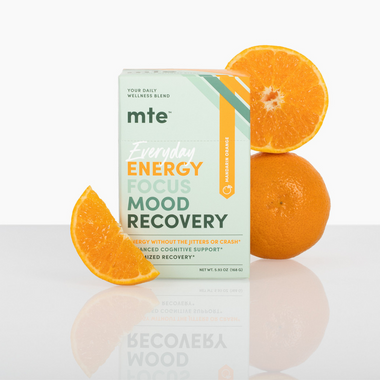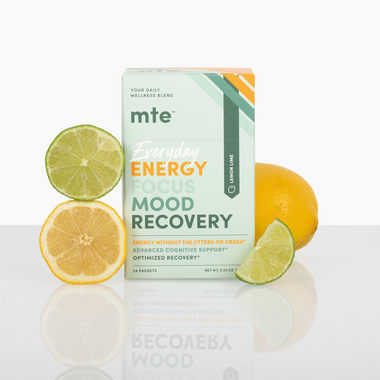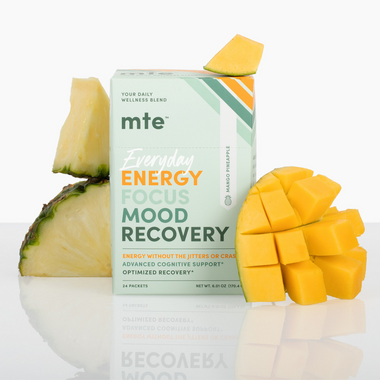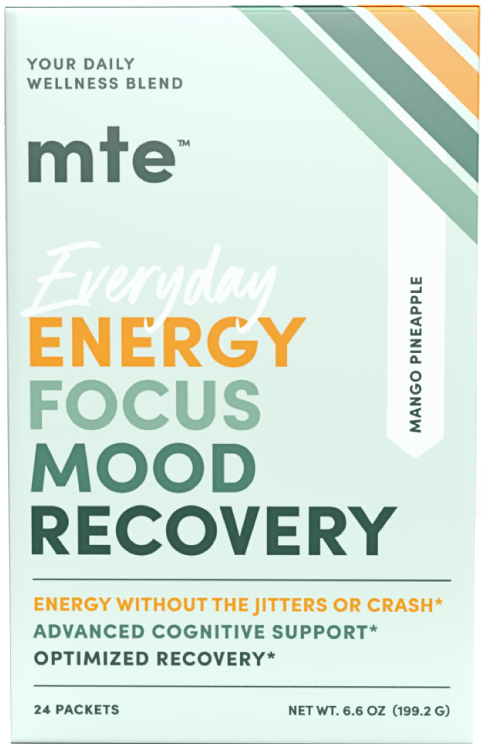
Sustainable Energy Sans Caffeine? Yes, Please!
The internet is flooded with searches for caffeine-free alternatives to coffee, how to stay awake without caffeine, can you get energy without stimulants… the struggle is real. They call it a daily grind for a reason - you’re always slogging through it, bummed to get out of bed in the morning and bummed when you try and fail to go to sleep at night. It’s called living the dream. (SOS!)
But if you’re tired of coffee, energy drinks, and stimulant-powered workout supplements, it can be hard to know where to look for better ways to get healthy energy. It just takes a few simple habits and a research-backed nootropic drink that manages to fight stress, boost mood, promote a sharper mind, support better sleep, and even boost metabolism.
Caffeine-Derived Energy is Based on a Biological Lie
If caffeine were a character in mythology, it would be a trickster god. Or maybe a creepy fairytale creature like Ursula. It offers you something great; it seems too good to be true! But even though it does exactly as promised, there are unforeseen costs that also come with it. Ariel got her legs but lost her voice. We got our natural energy boost but lost our sleep health, immunity, mood, and stress resilience.
Plus, after each energy boost comes a bigger energy crash. All these things are because caffeine isn’t really creating energy at all; it’s stifling certain chemical signaling and flooding others, tricking our nervous systems into a false stress response. It’s energy necromancy! We’re awake, but we’re not really there, and kind of wish we were dead.
So let’s get into how you can get out of that evil octopus-woman contract and get energy without caffeine. And maybe I’ll chill out on the metaphors. Stay tuned.
6 Smart Habits for an Energy Boost without Caffeine
-
WATER IS LIFE. Start your morning by drinking at least 16oz of water, preferably 32oz. Make sure to stay hydrated throughout the day; dehydration leads to brain fog and fatigue.
-
A nutrient-rich diet does wonders for energy levels. You give your body the stuff it needs to perform all its functions without outside help. You also foster a better gut microbiome, which helps everything from sleep to mood to metabolism, and more.
-
Go on a walk and/or workout, even if it’s short. Physical exertion releases endorphins and neurochemicals associated with better mood and improved energy.
-
Have a smart snack. If you’re starting to feel drowsy in the middle of the day, grab a handful of nuts or whole grains. They keep energy and focus levels up longer than sugars and simple carbs, and they’re part of that nutrient-rich diet vibe.
-
Add an energy supplement without caffeine, like a daily wellness blend with nootropics and an adaptogen stack. Finding another natural (but way better) energy booster will give you something to replace caffeine with as you cut down.
-
If you’re feeling drowsy, try a distraction. Playing music can keep your interest or, if it’s high energy, get you energized, too! Chewing gum can help you keep your head off the desk, too; peppermint gum has been shown to promote better mood, energy, and focus.
5 Nootropics that Boost Energy & Focus without the Crash
-
Paraxanthine is the newest development in nootropic energy without caffeine. It is a metabolite of caffeine, which means it’s produced when caffeine is broken down during digestion. Originally, paraxanthine was only able to be observed in laboratory processes. But now, it’s been effectively synthesized by enfinity®. Paraxanthine boosts energy as effectively as caffeine, but without its negative side effects.
-
Saffron is both a superfood and a nootropic, and has been used for tens of thousands of years - yes, actually. Saffron is packed with essential vitamins, minerals, and nutrients we don’t often get enough of in our diets. On top of that, it contains four of the most powerful antioxidants we know of: safranal, picrocrocin, crocin, and crocetin. This dual nature allows it to supply your body with fuel and scavenge harmful toxins at the same time, boosting energy and immunity.
-
L-theanine is a nootropic found in most tea leaves and some species of functional mushroom. Theanine is credited for the focus-boosting benefits of green tea. It has been shown to increase alpha wave activity in the brain, which is associated with a calm, clear, and focused mind.
-
Cannabinoids are a class of nootropic compounds associated with the cannabis plant. Mammals naturally have endocannabinoid receptors, which is why compounds like CBD, CBN, and THC directly affect us. Cannabinoids have been shown to promote brain health and cognitive function while reducing stress. They primarily act on the hippocampal region, so also modulate chemicals associated with mood and motivation.
-
Lion’s Mane is a species of functional mushroom that does some serious work for brain health. Hericenones and erinacines boost immunity, promote neurogenesis, protect the health of existing brain cells, and support against stress and anxiety, leaving you with a clear, alert mind, no caffeine necessary.
For a deep dive on these bioactivity-packed compounds and a summary of the research on each, read our article: 5 of the Best Nootropics for Caffeine-Free Peak Performance.
4 Receipts from the Latest Research on Nootropics for Energy
-
A 2022 review summarized research on several classes of nootropics. They found that nootropics are safe and rarely cause side effects. They also found nootropics were effective at increasing alertness, focus, cognitive performance, and sleep.
-
A 2022 study on multi-component nootropic supplements (aka nootropic stacks) improved cognitive flexibility, creativity, mood, motivation, and processing speed without increasing heart rate or anxiousness.
-
A 2023 study on the safety and efficacy of paraxanthine observed a dose-dependent relationship with reduced body weight, which is an indication it boosts metabolism and energy levels. There were no mutagenic effects or toxicity even at high doses, indicating paraxanthine is a safe alternative to caffeine.
-
A 2013 review on the health benefits of saffron found studies that support its use for immune, cardiovascular, and mood health. Research also supports its antioxidant, anxiolytic, and neuroprotective activities supporting brain and cardiovascular health.
3 Developments in Caffeine-Free Daily Energy Supplements
We aren’t relegated to Red Bull® and Bang!® anymore. Now that researchers across the fields of food and medicine are delving into the bioactivity of natural plants and compounds, there have been a few important developments in energy supplements in the last few years. However, you’ll only find them in boutique brands that are at the cutting edge of daily energy supplements.
Hint hint.
-
Move over, artificial sweeteners! There’s a new no-cal sugar alternative in town. Stevia is derived from the stevia plant, so it’s basically just another kind of sugar. That means none of the health risks that come with artificial sugars, but also none of the calories or side effects of regular sugar. Why isn’t it everywhere? Because many energy drink companies prioritize production cost over product quality.
-
Help is on the way, dear! Paraxanthine is here to filter out all the crappy parts of caffeine, offering sustainable energy without overstimulation. It’s new to the game, so you won’t find paraxanthine in many products yet, but you can find it in MTE!
-
Turns out size doesn’t matter. You don’t need to chug a 20oz can or guzzle a liter of coffee to get your boost anymore. With laboratory techniques and production processes that extract and concentrate the desired compounds, you can pack all the health benefits of 9 different nootropics and adaptogens into a little packet of daily greens powder. Mix it with anything; take it anywhere. No need to refrigerate, either!
2 Ways to Help You Wean off All That Caffeine
If you’re in the weeds with caffeine, you will likely experience some not-so-fun side effects while you switch to a better energy solution. Even if you only plan to cut down on your caffeine intake, the headaches and stress sweats can send even the strongest of us back to the coffee machine for another cup. Is it a really addictive drug? No Doubt. Can you cut down without wanting to throw yourself off a roof? Absolutely.
Two of the best tips that will help minimize the withdrawal are to prioritize sleep and to keep a nutrient-rich diet. Both of these things will maximize the resources you provide your body to create and store its own energy. For a deep dive on this, read our article: 10 Tips to Help You Quit Caffeine Without Losing Your Mind.
1 Great Reason to Try MTE
Okay, well, imho there are more than a few reasons to give MTE a try. But the overarching theme of it all, and the real reason to try it, is that it benefits foundational wellness. Nootropics are stacked with adaptogens and bolstered by superfoods to replace all those health supplements you can’t feel working, and provide a sustainable energy boost that outplays, outwits, and outlasts caffeine. The tribe has spoken. Please pack your knives and go. Sashay away. Or whatever it is…
The point is, MTE is the new wave of healthy energy: a boost for your mind and body that doesn’t come with side effects or caveats. Learn more about it on our Wellness Blog and head to the Shop to get the deets.






